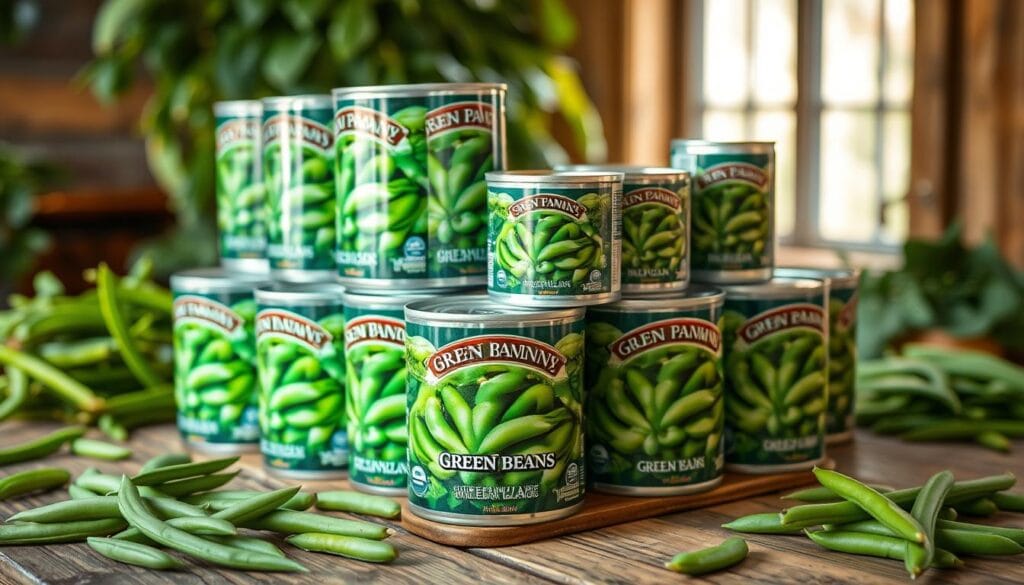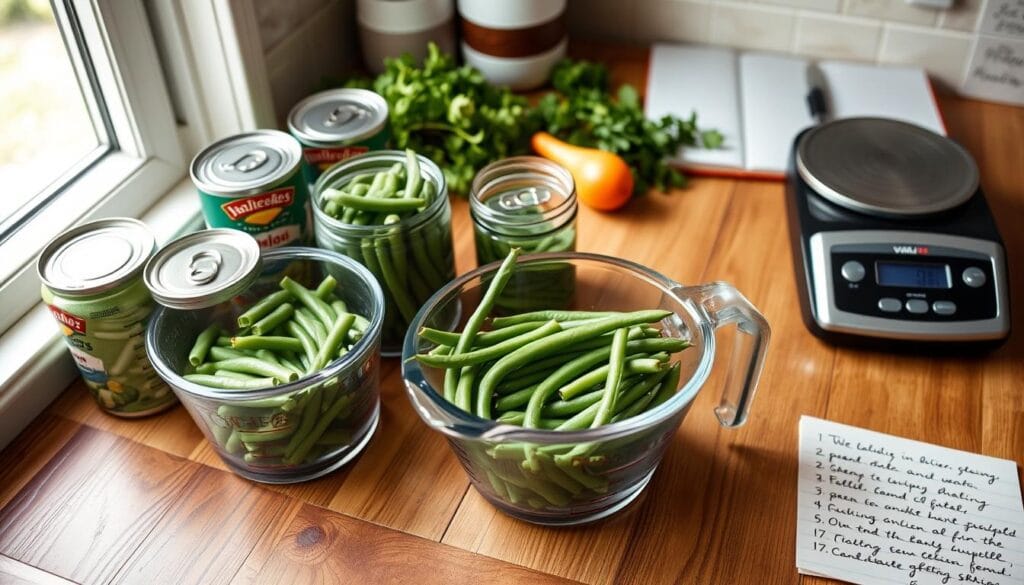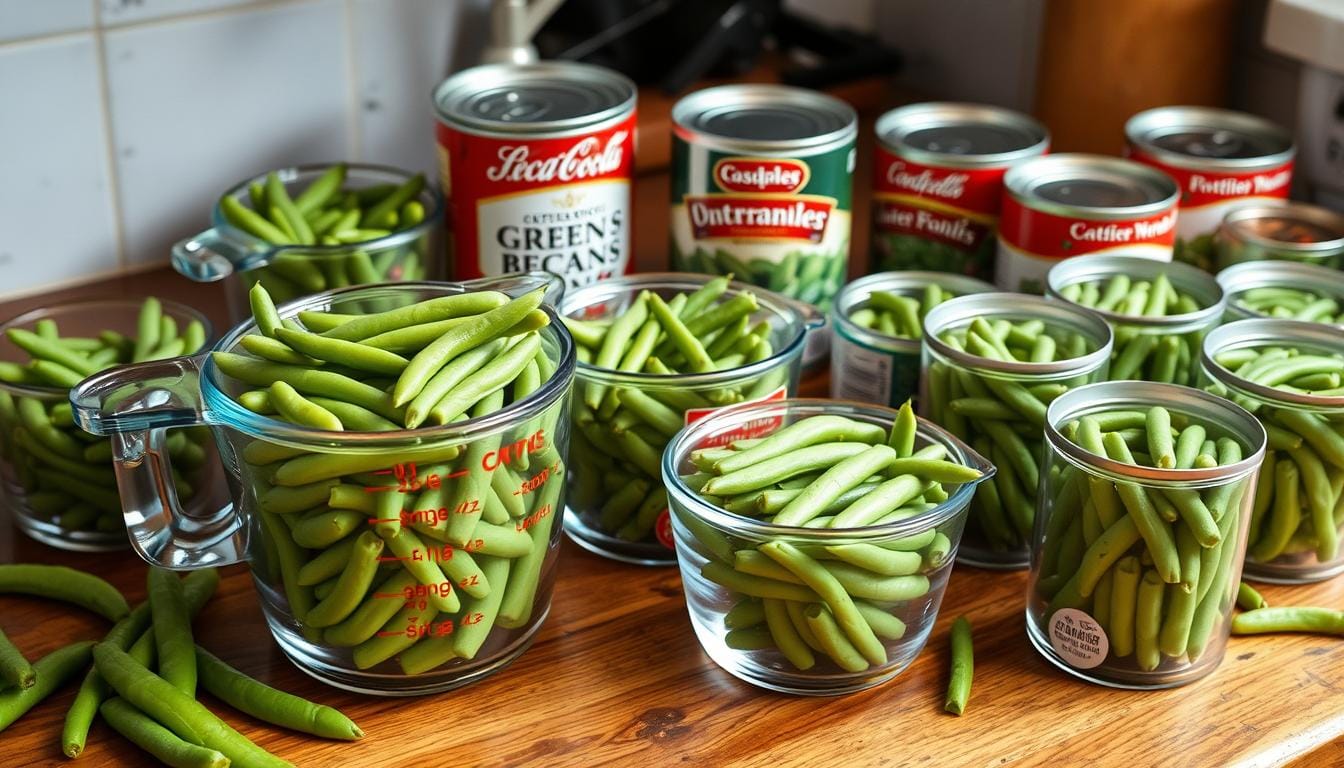I love being in the kitchen, especially with beans. From kidney beans to green beans, I’ve tried them all. Figuring out green bean measurements is key, whether for a classic casserole or a new dish. How many cans are 4 cups of green beans? Knowing this conversion can save time when you’re working with canned beans instead of fresh.
In this guide, we’ll explore green bean conversions. We’ll look at can sizes and how to switch between canned and fresh. By the end, you’ll know how to use green beans in any recipe with ease. Let’s begin!
Understanding Green Bean Can Measurements
Working with canned green beans requires knowing the standard sizes and their contents. The most common sizes are 15-ounce and 28-30-ounce cans. A 15-ounce can holds about 1 1/2 cups of drained, cooked green beans. On the other hand, the larger 28-30-ounce can has around 3 cups of drained beans.
Volume vs. Weight Measurements
Green bean measurements can be in volume (cups) or weight (ounces or grams). This can cause confusion when converting between them. Generally, 1 cup of drained, cooked green beans weighs about 4 ounces or 113 grams.
Common Kitchen Conversions
- 1 cup = 240 milliliters (mL)
- 1 ounce (oz) = 28 grams (g)
The USDA FoodData Central offers precise data on the nutrient content and measurements of various legumes, including green beans. This helps you make better choices in the kitchen.
| Can Size | Volume (Drained Beans) | Weight (Drained Beans) |
|---|---|---|
| 15 ounces | 1 1/2 cups | 10 ounces |
| 28-30 ounces | 3 cups | 20-22 ounces |
Basic Green Bean Conversion Rules
Working with green beans in the kitchen can be easier with basic conversion rules. These rules apply to canned, dried, or fresh green beans. They help adjust measurements and quantities for your recipes.
Here are the key green bean conversion rules to keep in mind:
- 1 can (15 oz) of drained green beans = 1½ cups of cooked green beans
- 1 lb of dried green beans = 2.5 to 3 lbs of cooked green beans or 6 cups of cooked green beans
- 1 part of dry green beans = 3 parts of cooked green beans
- 1/3 cup of dried green beans = 1 cup of cooked green beans
- A heaping 1/2 cup of dried green beans = one 15-ounce can of green beans
- 1 1/2 cups of cooked green beans, drained = one 15-ounce can of green beans
These rules are great for recipes like chili, soups, or casseroles. They make it easy to swap cup to can ratios and green bean serving sizes as needed.
“Keeping these green bean conversion guidelines handy can save you time and ensure your dishes turn out perfectly, even when you need to adjust the recipe on the fly.”
Knowing these basic rules helps you confidently work with green bean measurements. You’ll make delicious, well-balanced meals every time.
How Many Cans Are 4 Cups of Green Beans?
Converting green bean measurements is all about cans and cups. One 15-ounce can of green beans gives about 1.5 cups of cooked beans. To figure out how many cans are in 4 cups, we do a simple math.
Divide 4 cups by the yield per can (1.5 cups). This tells us 2.67 cans are needed for 4 cups of green beans. But, since you can’t buy a fraction of a can, you’ll need 3 cans.
Accounting for Liquid Content
Remember, canned green beans include both beans and liquid. After draining, a 15-ounce can weighs about 10 ounces. The rest is liquid. So, when you measure 4 cups of green beans, consider the drained weight, not the whole can.
| Measurement | Equivalent |
|---|---|
| 4 cups of green beans | Approximately 2.67 cans (rounded up to 3 cans) |
| 1 (15 oz) can of green beans | Yields 1.5 cups of drained, cooked beans |
| 1 (15 oz) can of green beans | Weighs 10 oz once drained |
Knowing these green bean measurements makes it easy to figure out how many cans you need for recipes with 4 cups of green beans.
Standard Can Sizes for Green Beans
Knowing the standard can sizes for canned vegetables is key for canned vegetable conversions and pantry essentials. For green beans, there are a few common sizes:
- No. 300 can: Holds 14-16 oz. or about 1¾ cups of green beans.
- No. 303 can: Contains 16-17 oz. or roughly 2 cups of green beans.
- No. 2½ can: Holds 27-29 oz. or 3½ cups of green beans.
The No. 10 can is great for bigger servings or food service. It can hold 6 pounds 6 ounces to 7 pounds 5 ounces of green beans. That’s about 12 cups.
A standard can of green beans usually has about 1.5 cups. To get 4 cups, you need to open about three standard cans. This rule of thumb helps when planning recipes and portioning canned produce.

Knowing the different can sizes and how much green beans they hold is crucial for canned vegetable conversions and keeping a good pantry essentials stock. This knowledge helps you accurately use canned green beans in your cooking.
Converting Between Fresh and Canned Green Beans
When making green bean recipes, you can choose between fresh or canned beans. Knowing how to switch between them is useful for meal planning. It helps you add more green bean measurements to your dishes.
Fresh to Canned Ratios
One pound of fresh green beans is about 2 cups of cooked beans. So, if a recipe needs 4 cups, you can use two 14.5-ounce cans of canned beans instead.
Storage Considerations
Canned green beans are easier to store. They can last up to a year in a pantry. Fresh green beans, however, should be kept in the fridge. They stay fresh for about a week.
This makes canned beans great for meal planning with canned goods. They’re perfect for quick recipes when you need green beans.
Choosing between fresh and canned green beans depends on your taste, the recipe, and convenience. Both can be tasty. Knowing how to switch and store them helps you plan meals better.
Measuring Tips for Green Bean Recipes
When making tasty green bean dishes, getting your measurements right is crucial. Whether you’re using fresh or canned beans, knowing about kitchen math and canned vegetable conversions is key. It can greatly affect how your recipe turns out.
To get your measurements spot on, use a kitchen scale for weight and standard cups for volume. This method helps you mix ingredients just right. It prevents mistakes like too much or too little seasoning in your dish.
If you need to change the recipe size, a beans conversion calculator is super helpful. These online tools take into account the special qualities of different beans. They make it easier to adjust amounts while keeping the flavor and texture just right.
| Measurement | Equivalent |
|---|---|
| 1 pound of fresh green beans | 3 to 4 cups trimmed and cut |
| 1 (15 ounce) can of green beans | 1 1/2 to 2 cups drained and rinsed |
| 1 (14.5 ounce) can of green beans | About 1 3/4 cups drained and rinsed |
Using these kitchen math and canned vegetable conversion tools will help you make amazing green bean dishes. Your recipes will be perfectly balanced and true to the original recipe.
“Precision in the kitchen is the foundation for culinary success. Pay close attention to your measurements, and your green bean recipes will shine.”

Green Bean Portion Control Guidelines
Understanding green bean serving sizes is key. The right serving size is usually ½ cup to 1 cup. This can change based on age, gender, and diet needs.
Serving Size Recommendations
- Adults should aim for 1 cup of cooked green beans.
- Children need about ½ cup of cooked green beans.
- Adjust the size based on your calorie needs and diet.
Nutritional Considerations
Green beans are nutritious, but watch the portion control for canned vegetables. Canned green beans might have extra sodium. Rinsing them can help cut down on sodium.
Green beans are low in calories and rich in fiber. They’re great for meals. But, remember to keep portion sizes in check to stay balanced and avoid eating too much of one thing.
“Portion control is key when it comes to enjoying the benefits of green beans. By sticking to the recommended serving sizes, you can incorporate this nutritious vegetable into your diet without compromising your overall health.”
Home Canning Green Beans
Preserving fresh pantry essentials like green beans is rewarding. Learning to can green beans at home is a great skill. It helps you stock up your pantry with tasty, safe food.
Use a pressure canner for green beans because they’re not very acidic. First, clean and trim the beans, then cut them into small pieces. Sterilize your jars and lids as the maker says.
- Pack the green beans into the jars, leaving a 1/2-inch space.
- Add 1/2 teaspoon of canning salt per pint jar.
- Fill the jars with boiling water, keeping the 1/2-inch space.
- Wipe the rims and put on the lids and bands.
- Process the jars in a pressure canner at 10 pounds of pressure for 25 minutes, adjusting for altitude.
- Let the jars cool for 12 to 24 hours before storing them in a cool, dark place.
Always follow the latest USDA canning guidelines for safe, quality green beans. With the right steps and care, you can enjoy your canned pantry essentials for up to a year.
| Ingredient | Quantity |
|---|---|
| Fresh Green Beans | 3-4 lbs |
| Onion, medium | 1/2 |
| Dill Seeds | 3 tsp |
| Red Pepper Flakes (optional) | 3 tsp |
| Canning Salt | 1/2 tsp per pint jar |
| Water | 3 cups |
| Distilled White Vinegar (5%) | 3 cups |
With these easy steps and the right ingredients, you can enjoy home-canned green beans. They’re perfect for your meal planning with canned goods for months.
Storage and Shelf Life of Canned Green Beans
Proper storage and knowing the shelf life of canned green beans are key. They keep your food fresh and quality high. Canned green beans are great for meal planning with canned goods.
Proper Storage Methods
Keep canned green beans in a cool, dry spot away from sunlight. Warm, damp places can cause them to spoil faster. Unopened cans can last up to a year if stored right.
Expiration Guidelines
Canned green beans last a long time, but check the expiration date. Look for damage, bulges, or leaks. These signs mean the can is bad and the beans might not be safe. After opening, keep leftovers in the fridge for 3-4 days for best taste and safety.
| Item | Shelf Life | Storage Conditions |
|---|---|---|
| Unopened Canned Green Beans | Up to 1 year | Cool, dry place away from direct sunlight |
| Opened Canned Green Beans | 3-4 days | Refrigerated |
Knowing how to store and when to use canned green beans keeps them fresh. This helps in meal planning with canned goods.
Common Mistakes in Green Bean Measurements
Getting the right amount of green beans is key to a great dish. But, many home cooks make mistakes that affect the taste and texture. One big error is mixing up volume and weight measurements, leading to wrong amounts.
Another mistake is not considering the liquid in canned beans. This can mess up the recipe’s balance. Also, using wrong ratios for fresh to canned beans can lead to bad substitutions. To fix these issues, use precise measuring tools and check reliable conversion charts or online calculators.
By tackling these green bean measurements and kitchen math problems, you can make sure your green bean dishes are always perfect. They will have the right texture, flavor, and consistency.

